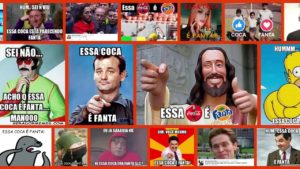Since I am currently working in Brazil, I thought I’d write a post on international marketing. Global brands know the importance of market research and that understanding culture is imperative to connect with a targeted audience. We have also learned from our guest speaker, Brandon Roshon, that to be culturally relevant, marketers have to observe what is happening in the world and gather data from them. Simply translating an ad or commercial in a different language is inadequate communication with consumers. Brands have to understand the culture of their target consumers and relate to them as a way to increase sales. This is particularly important for specific consumer segments, such as the LGBTQ consumers, as demonstrated by a recent marketing campaign by Coca-Cola in Brazil.
In 2017, Coca-Cola created a marketing campaign that turned a homophobic phrase into something positive and empowering. In Brazil people used the phrase “Essa Coca É Fanta” as a homophobic expression, literally translated to “That Coke is a Fanta,” suggesting that a person might look “straight” but might actually be homosexual. By using a phrase filled with hate that many used to make fun of homosexuals, Coca-Cola gave it a new meaning in their ad. The Youtube video below opens with a statement that many different phrases across the globe are used as homophobic expressions, citing examples from Argentina, Spain, and the United State of America. The tone of the video is light and “poking fun” at the use of the homophobic expression portraying an embracing attitude that is inclusive, accepting and celebratory. The video attempts to connect to the specific cultural context of the targeted audience by celebrating differences and empowerment.
Instead, Coca-Cola switched the phrase by creating the “Essa Coca É Fanta, E dai” campaign, translating to “That Coke is a Fanta, So what?” Coca-Cola created a limited edition can with the Fanta beverage inside and launched it on the International LGBT Pride day. The campaign quickly became a phenomenon in Brazil–everyone loved it. It garnered 1 billion impressions and even had Brazil’s most popular LGBT singer Pabllo Vittar express his love for the campaign. Brazilian culture went crazy and created user-generated content varying from memes to videos on Facebook and YouTube to fake merchandise. The campaign became viral, which suggests that Coca-Cola listened and talked to their target audience by addressing a prevalent and relevant social issue for the consumer segment while advertising their product.
According to the video, Coca-Cola invested $0 US dollars in media investments and still garnered 1 billion media impressions (Meio & Mensagem, 2018). The campaign became known as “the most engaging organic campaign in 2017” and changed the way people used the expression (Meio & Mensagem, 2018). Global brands such as Coca-Cola understand that importance of talking to all people, not only heterosexuals but homosexuals as well. The best way to reach minority groups like the LGBT community is by using culture to connect with them on a deeper level and making them love the brand. Coca-Cola capitalized on a popular expression and then appropriating it to fit Coca-Cola’s social message and social activism as part of their marketing.
Can you think of any other successful marketing campaigns that have used culture to connect with specific consumer segments (ex. #likeagirl)? How do you think Coca-Cola used Jonah Berger’s Contagious STEPPS to make this campaign successful?
References
Meio & Mensagem. (2018). PR / Ouro: Essa Coca é Fanta. Retrieved from http://www.wavefestival.com.br/premiados2018-pr/essa-coca-e-fanta-310/
DAVIDTHEAGENCY1. (2018). Coca-Cola | Essa Coca É Fanta. Retrieved from https://www.youtube.com/watch?v=aiyoy2A7kPo

2 Responses to International Marketing: Essa Coca É Fanta